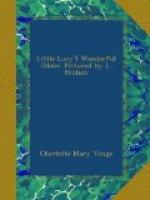“What are you looking at?” asked Lucy, coming to her side.
“I’m watching for the procession. Then I shall go to church with mamma. Look! That way we shall see it come; these two mirrors reflect everything up and down the street.”
“Are you dressed for church?” asked Lucy. “You have no hat on.”
“Where does your grace come from not to know that a mantilla is what is for church? Mamma is being dressed in her black silk and her black mantilla.”
“And your shoes?”
I could not wear great, coarse, hard shoes,” said the little Dona Ines; “It would spoil my feet. Ah! I shall have time to show the Senorita what I can do. Can your grace dance?”
“I danced with Uncle Joe at our last Christmas party,” said Lucy, with great dignity.
“See now,” cried the Spaniard; “stand there. Ah! have you no castanets?” And she quickly took out two very small ivory shells or bowls, each pair fastened together by a loop, through which she passed her thumb so that the little spoons hung on her palm, and she could snap them together with her fingers.
Then she began to dance round Lucy in the most graceful swimming way, now rising, now falling, and cracking her castanets together at intervals. Lucy tried to do the same, but her limbs seemed like a wooden doll’s compared with the suppleness and ease of Ines. She made sharp corners and angles, where the Spaniard floated so like a sea-bird that it was like seeing her fly or float rather than merely dance, till at last the very watching her rendered Lucy drowsy and dizzy; and as the church bells began to ring, and the chant of the procession to sound, she lost all sense of being in sunny Malaga, the home of grapes.
CHAPTER XIV. GERMANY.
There was a great murmur and buzz of learning lessons; rows upon rows of little boys were sitting before desks, studying; very few heads looked up as Lucy found herself walking round the room—a large clean room, with maps hanging on the walls, but hot and weary-feeling, because there were no windows open and so little fresh air.
“What are you about, little boy?” she asked.
“I am learning my verb,” he said; “moneo, mones, monet.”
Lucy waited no longer, but moved off to another desk. “And what are you doing?”
“I am writing my analysis.”
Lucy did not know what an analysis was, so she went a little further. “What are you doing here?” she said timidly, for these were somewhat bigger boys.
“We are writing an essay on the individuality of self.”
That was enough to frighten any one away, and Lucy betook herself to some quite little boys, with fat rosy faces and light hair. “Are you busy, too?”
“Oh, yes; we are learning the chief cities of the Fatherland.”
Lucy felt like the little boy in the fable, who could not get either the dog, or the bird, or the bee, to play with him.




